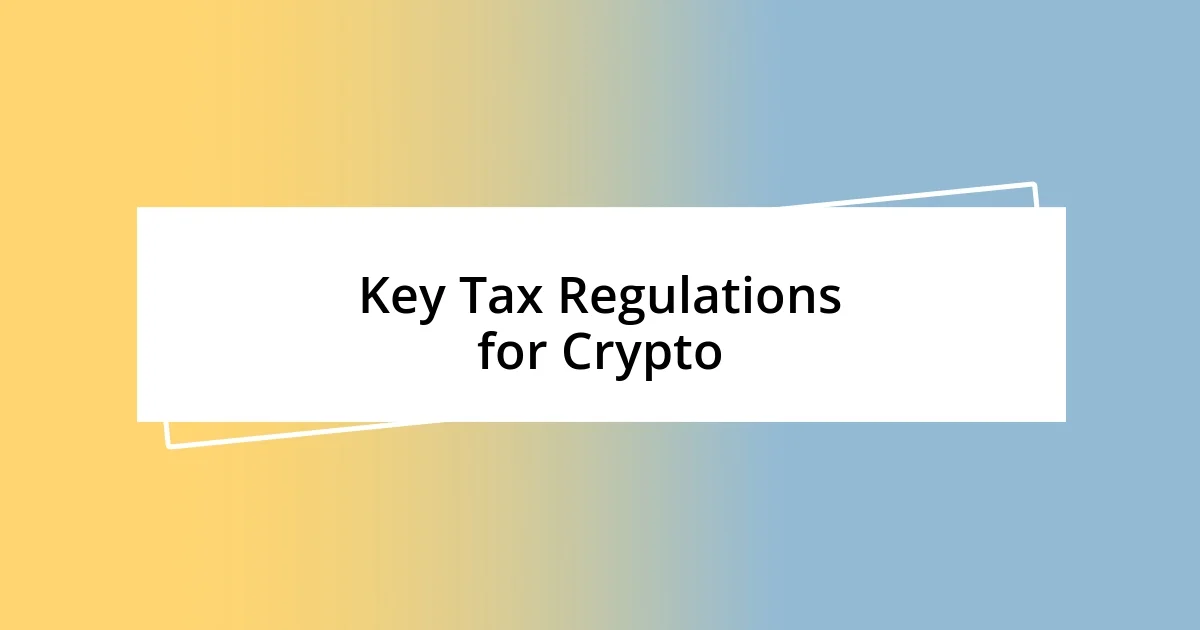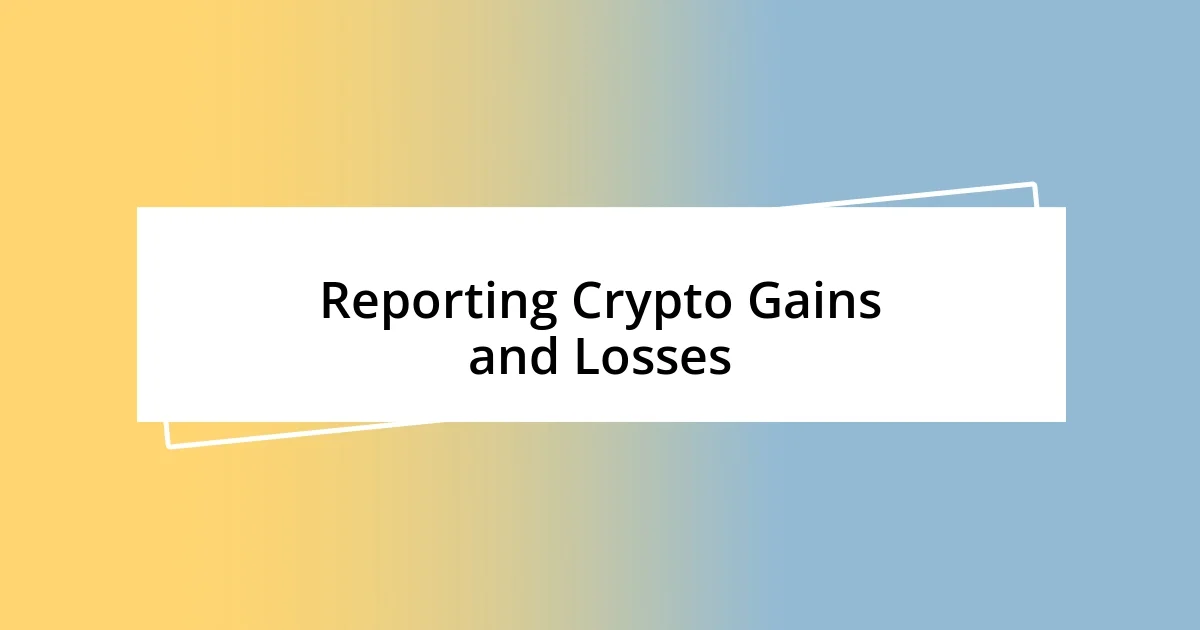Key takeaways:
- Every cryptocurrency transaction is typically taxable, necessitating meticulous record-keeping and tracking to ensure compliance.
- Understanding key tax regulations, such as capital gains, deductible losses, and tax implications of airdrops, is crucial for effective tax management.
- Consulting a professional tax advisor can significantly enhance understanding of tax strategies and help avoid costly mistakes.

Understanding Crypto Tax Basics
Understanding crypto tax basics can feel overwhelming, especially when you consider the rapid pace of changes in regulations. I remember when I first dove into the world of cryptocurrency—seeing my small investments grow, but then grappling with the realization that all those gains would come with tax implications. It’s almost like a roller coaster: thrilling at the top and daunting on the way down.
Did you know that every transaction involving cryptocurrency is typically taxable? For instance, exchanging Bitcoin for Ethereum might feel like just a simple swap, but in the eyes of the IRS, it’s a sale. This revelation hit me hard when I learned that I needed to track the value in USD at the time of each transaction. It really made me rethink how I documented my trades.
Many people overlook the importance of record-keeping in crypto transactions. Personally, I found that using a dedicated tracking tool transformed my approach. It not only eased my anxiety during tax season but also provided clarity on my overall investment journey. Have you considered how keeping thorough records can change your experience with crypto tax compliance?

My Journey into Crypto Taxes
Navigating the realm of crypto taxes was daunting at first, much like trying to decode a foreign language. I vividly recall the moment I sat down with a stack of digital receipts and my laptop, feeling a mix of anxiety and determination. It struck me how crucial it is to not just claim gains, but also to account for losses. Those moments of confusion surrounding tax implications were eye-opening, and they motivated me to learn more deeply about what the IRS expects from crypto investors.
As I continued my journey, I stumbled upon various platforms that offered assistance with crypto tax compliance. I remember trying a couple of different tax-calculating software options, each with its quirks. What I found particularly useful was the ability to integrate my exchange accounts for automatic tracking. Just envisioning the time I saved on manual entries made it worthwhile. The relief of knowing my taxes were being properly calculated eased my worries, allowing me to focus more on my investments rather than stressing over compliance.
In moments of struggle, such as when faced with the complexity of capital gains and loss deductions, I learned how essential it is to stay educated. An experience I won’t forget was attending a webinar specifically discussing crypto taxes. It was engaging to hear from experts who demystified the jargon and shared personal experiences. Their insights made it clear: I wasn’t alone in this endeavor. How has your own journey into the intricacies of crypto taxes shaped your investment experience?
| Aspect | My Experience |
|---|---|
| Initial Confusion | Feeling overwhelmed by regulations |
| Record-Keeping | Essential but challenging; using tools helped |
| Tax Software | Provided clarity and saved time |
| Education | Webinars and resources were game-changers |

Key Tax Regulations for Crypto
Understanding the key tax regulations for cryptocurrency has been a pivotal part of my journey. I still remember the moment I discovered that the IRS mandates reporting for every crypto transaction. It felt like a wake-up call, especially when I learned that even a simple transaction like sending funds to a friend could have tax implications if there were gains involved. It was a mix of confusion and urgency that led me to dig deeper into compliance.
Here are some key regulations to keep in mind:
- Short-term vs. Long-term Capital Gains: Gains from assets held for less than a year are usually taxed at a higher rate than those held for longer than a year. I experienced this firsthand when I had to sort through my trading history.
- Tax Listings for Exchanges: Many crypto exchanges provide tax documentation, which can ease the filing process. I found these reports incredibly helpful during tax preparation because they aggregated my activity.
- Deductible Losses: If you’ve sold assets at a loss, you can often deduct those losses. Learning to leverage this has transformed my strategy, allowing me to offset gains from successful trades.
- Record-Keeping Requirements: The IRS suggests retaining records for all transactions, which can be a daunting task. Initially, I underestimated this, but now I view detailed record-keeping as my safety net for compliance.
- Tax Treaties: Understanding how international tax treaties may affect crypto gains when trading with foreign exchanges was a revelation—I hadn’t considered this impact on my tax obligations until I dug into it.
As my understanding grew, I started feeling a sense of empowerment. Implementing some of these regulations made tax time less about panic and more about strategic planning.

Tracking Crypto Transactions Effectively
Tracking my crypto transactions effectively became a crucial part of my journey. Initially, I relied on spreadsheets, but it felt incredibly tedious and prone to errors. I remember that one chaotic evening where I miscalculated my gains and realized I might owe more in taxes than I expected—it was a sobering moment that prompted me to search for better solutions.
Discovering crypto tax software was a game-changer for me. I can vividly recall the ease of linking my exchange accounts and watching as my trades populated automatically. It felt like finally having a personal assistant dedicated to sorting through my crypto chaos! Have you ever experienced the frustration of manual data entry? Automating those processes not only saves time but also allows for more accurate reporting, easing the anxiety that often accompanies tax season.
As I refined my tracking methods, I found that frequently updating my transactions helped maintain clarity. I instituted a routine where I would sit down at the end of each week to review my activities. This not only kept my records current, but I discovered it also gave me a greater sense of control over my investments. Have you ever felt overwhelmed by your trading volume? Breaking things down into manageable chunks transformed my approach, turning what once felt daunting into an empowering exercise.

Reporting Crypto Gains and Losses
Reporting crypto gains and losses is one of the more challenging aspects of tax compliance, but it can be surprisingly straightforward once you dive in. I still remember how daunting it was to gather all those numbers after a year of active trading. It felt like I was solving a giant puzzle, where every piece had to fit just right to paint an accurate picture of my earnings and losses. That moment of piecing it all together reminded me of how crucial it is to know exactly what needs to be reported.
One thing that really hit home for me was the difference between realized and unrealized gains. When I sold my first asset at a profit, I felt elated until I realized I was responsible for reporting that gain. I thought, “Wait, isn’t this just a digital currency?” But that euphoric feeling quickly turned to anxiety as I understood that the IRS wants to know every detail of those transactions. Have you ever gone from excitement to dread in seconds? I definitely have, and that reality check pushed me to stay on top of my tracking.
As tax season rolled around, I learned to embrace the idea of reporting losses, too. I had a couple of trades that didn’t pan out—perhaps you can relate? I remember feeling almost relieved when I realized I could deduct those losses against my gains, effectively reducing my taxable income. It’s those little victories that can transform the whole reporting process from a burden into a strategic game plan, allowing me not just to comply, but to optimize my tax situation. How has your perspective on losses shifted? If you view them as opportunities, you might find the experience less overwhelming and more enlightening.

Avoiding Common Tax Mistakes
When I first got into crypto, I underestimated the complexities of record-keeping, which almost cost me dearly. One seemingly minor detail I overlooked was the importance of keeping receipts for my cryptocurrency purchases. I remember frantically searching my inbox for old transaction emails come tax time, only to find many missing. Have you ever been caught off guard by something so simple? That experience taught me that meticulous record-keeping is not just about avoiding headaches; it’s about safeguarding your financial well-being.
Another mistake I made involved neglecting to track airdrops and forked coins. At first, I thought they were just free tokens that didn’t need reporting. But as I learned the ropes, I realized these can count as ordinary income, taking me by surprise during filing. Those little surprises can lead to significant tax liabilities if you’re not careful! How about you? Have you accounted for every potential income source? Creating a habit of reviewing all potential gains, no matter how small, has since become a cornerstone of my tax compliance strategy.
Lastly, I discovered the pitfalls of miscalculating the holding period for my assets. Initially, I naively assumed that holding for a year was the only way to benefit from long-term capital gains rates. But when I sold something I thought was long-held only to have it fall short, I was left with short-term rates that stung. It’s like the universe reminding me that even in the world of crypto, details matter! Have you ever had that feeling of sinking confidence when your calculations go wrong? Staying informed and double-checking details are crucial in avoiding such scenarios.

Seeking Professional Tax Advice
Seeking professional tax advice can be a game-changer in navigating the complexities of crypto tax compliance. After my initial missteps, I decided to consult a tax professional, and let me tell you, it was like flipping a switch. Suddenly, I had clarity on how to classify my transactions correctly. Have you ever felt that overwhelming relief when you finally grasp a tricky concept? I certainly did!
Working with a tax advisor helped me see not just the potential pitfalls but also opportunities I hadn’t considered. For instance, they pointed out specific strategies for tax-loss harvesting that I had completely overlooked. It was fascinating to learn how specific transactions could be optimized for better tax outcomes. Have you explored whether your trading habits align with maximizing those benefits?
Investing in professional guidance may seem like an additional expense, but it’s one that I learned can save you from costly mistakes down the road. The small fee I paid for that expert advice was dwarfed by the sum I saved in taxes. Reflecting on my journey, I realize that seeking help isn’t a sign of weakness but rather an investment in my financial peace of mind. Wouldn’t you agree that having a knowledgeable partner in the intricate world of crypto taxes is worth every penny?














